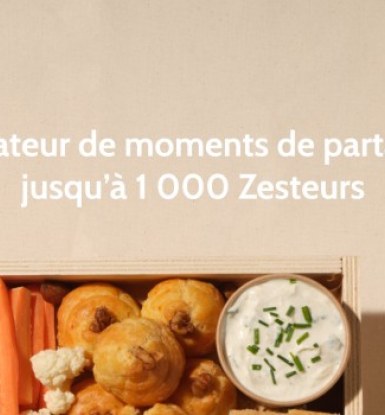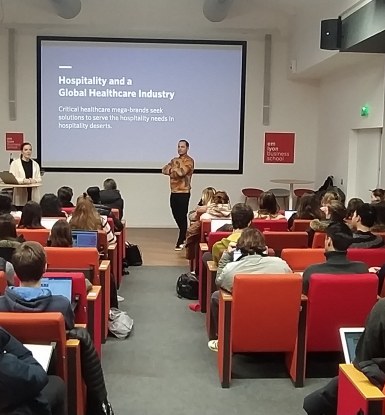No logo or sign, and an entrance hidden by fur coats. It’s impossible to know what’s inside this building at the gateway to Lyon.
This surprising place is actually an experiment conducted by the 72 students of the MSc in International Hospitality Management, a MSc in program run jointly by emlyon business school and the Institut Paul Bocuse.
12 different restaurants to manage in a week
On entering the building, the sound of a Charleston song reveals that we are in a speakeasy, recalling the illicit establishments that sold alcoholic drinks during the prohibition era.
Plunged into the 1920s, Martine Ferry, Program Director (for the Institut Paul Bocuse), tells me more about the concept: “For one week, students manage 12 concept restaurants, four in a day, with real customers and true concerns”.
Behind the bar, four restaurants where waiters and waitresses put the finishing touches to the customer’s tables. At the far end of the room, trainee cooks warm up the dishes prepared in the Institut Paul Bocuse’s kitchen and set out the plates. It’s Friday, 11:30am and customers will soon start arriving. There is a sense of excitement in the room.
This week marks the completion of a six-month work. Students started the project in October, with a session taught by John Buchanan, a well-known Foodservice expert and Vice President of Lettuce Entertain You Enterprises (LEYE), who examined various restaurant concepts. Then students worked on a specific idea for a restaurant, to develop a particular food type, decoration and atmosphere. Students also received important resources and support from Institut Paul Bocuse’s chefs and from Martine Ferry, Master’s Program Director.
Close attention to detail is the key to success for a concept restaurant, the aim being to provide a specific and memorable experience for the customer.
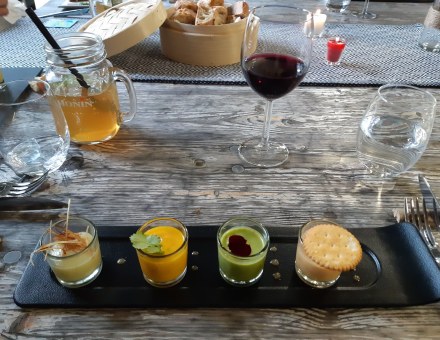
The "Omnis" restaurant
Buchanan introduces the four restaurants to me: First, the “Omnis” restaurant (a reference to the word “omnivorous”) makes no secret of its concept. Its slogan: “We cook the things that you don’t use, we cook the things that people throw away”
A student gives me more details: “Our concept is to combine fine dining with zero waste. To do that, we will use all the part of the product. In our pumpkin starter, we use the skin, seeds and the flesh of the pumpkin”.
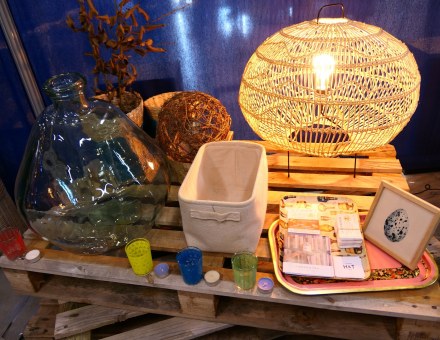
The “Eggxotic” restaurant
Next to Omnis, the Eggxotic Restaurant is quite explicit - the menu items are based on a single product: eggs
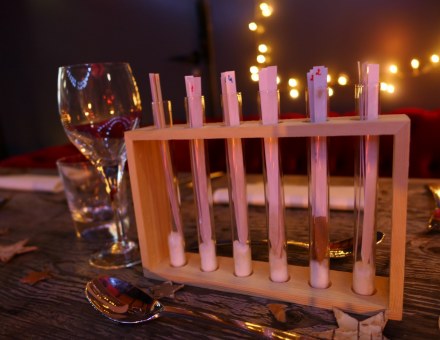
The “XX” restaurant
The XX restaurant is more intriguing. At the center of the table, instead of a menu, there are six tubes - each one containing a specific scent.
“This restaurant is based on the idea of scent. Customers make their menu choice based on what it smells like. You smell the menu,” Buchanan said.
Real life, true concerns
Talking to the students, it’s clear that they appreciate the experience. They all seem motivated and engaged with the project, and both happy and proud of their work.
Sarah, an MSc student explains: “As students, we're used to doing a lot of business plans and written work. Here, we have a very precious insight: the customer experience feedback, which is very rewarding. It's enriching and it creates a real team spirit”.
The project is part of the first semester of the MSc in International Hospitality Management.
The course delivered both by emlyon business school and Institut Paul Bocuse provides students with a solid foundation in general management as well as specialist knowledge in new venture creation, lifestyle hospitality management, brand design and innovation management.
Students spend four months in Lyon, three months in Paris, and three months in Shanghai Each stay has a different focus: foodservice and the restaurant industry in Lyon, Lodging Management in Paris, and International Hospitality Management in Shanghai, which includes a consultancy project with Chinese companies and projects with foreign companies in China.

